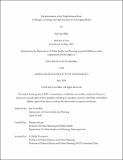Decarbonization at the Neighborhood Scale: Challenges, Learnings and Opportunities in an Emerging Model
Author(s)
Cina-Sklar, Zoë
DownloadThesis PDF (588.2Kb)
Advisor
Arcaya, Mariana
Terms of use
Metadata
Show full item recordAbstract
Decarbonizing residential buildings in the United States is critical for reaching climate goals and has significant public health and energy justice benefits if accessible to all. To date, building electrification has been individual-level and market-driven, with some financial incentives at the state and federal level. This model is generally inaccessible to low-income homeowners and renters who are unable to afford the upfront costs of building improvements and new electric appliances. Neighborhood-scale building decarbonization has been proposed as an alternative in which new developments would be built allelectric or existing buildings would be electrified at the block or neighborhood scale. In the latter use case, neighborhood-scale building decarbonization is often tied explicitly to decommissioning gas lines. Specifically, proponents posit that these projects could be funded through avoided gas line repair and replacement costs. Investor-owned utilities are seen by some experts in the space as key to the success of neighborhood-scale building decarbonization because of their financing capabilities and existing role in providing heating and/or electric service to customers. In recent years, a number of state policymakers have passed legislation approving utility-funded neighborhood-scale building decarbonization and state utility commissions have promulgated regulations approving cost recovery for these projects. Utilizing desk research and informant interviews, this paper analyzes what has enabled and hindered existing utility-funded neighborhood-scale building decarbonization pilot projects in California, Massachusetts, and New York. I diagnose strong and specific climate goals, the passage of enabling legislation, an engaged state utility commission, and strong advocacy ecosystems as key factors for initiating neighborhood-scale pilot projects. Through informant interviews, I identify costs, financing, community buy-in and planning as central determinants for the success of pilot projects and the future of the model. I close by offering recommendations and outstanding research areas for planners interested in pursuing future neighborhood-scale building decarbonization projects.
Date issued
2025-05Department
Massachusetts Institute of Technology. Department of Urban Studies and PlanningPublisher
Massachusetts Institute of Technology